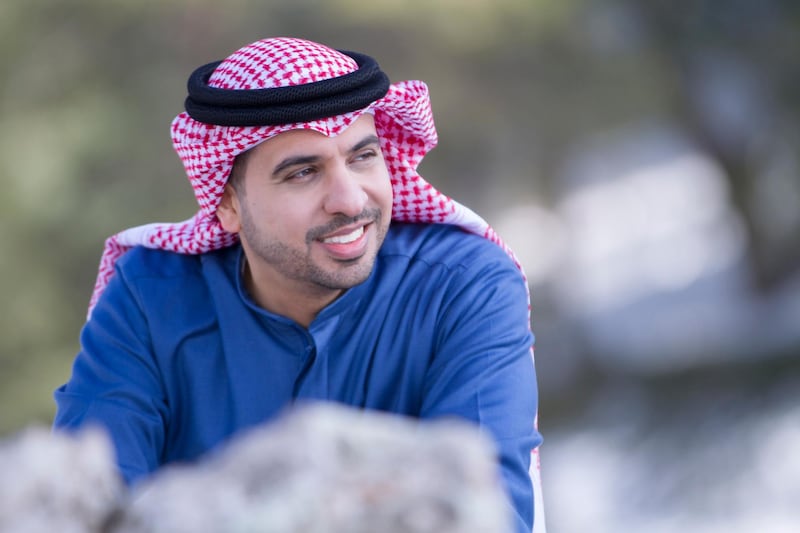While the Arabic entertainment scene takes a break during Ramadan, it has a season of its own when it comes to music releases.
Not a Ramadan goes past without a string of Arab pop stars releasing nasheeds – Islamic spiritual odes – extolling the blessings and virtues of the month. And this year is no different; big names such as the UAE pop star Hussain Al Jassmi released the reflective Ya Mouqaleb Al Qouloub while Egypt's Ramy Sabry put out two nasheeds Ya Satar and El Hakam El Adl.
______________________
Read more: Listen: four new nasheeds to celebrate Ramadan
______________________
While these tracks represent a shift away from their usual up-tempo sounds, Ramadan is also the time when seasoned nasheed singers release their latest works.
Ahmed Bukhatir’s colourful new nasheed
One of which is by the veteran Emirati artist Ahmed Bukhatir. For almost two decades, the Sharjah singer’s stirring nasheeds, released over eight albums, resulted in the 42-year-old amassing a worldwide fan base. He has undertaken tours of North America, Europe and Australia.
After taking a hiatus to pen his debut fantasy novel Dragon Boy and the Witches of Galza, which was launched at the Emirates Airline Festival of Literature four years ago, Bukhatir returned sporadically to the nasheed limelight with some one-off singles.
His latest track, Ramadan 2018, was released last week and stays true to his trademark sound. To cater to religious conservatives, the track doesn't have any musical instrumentation and instead has Bukhatir's voice manipulated to resemble a droning synthesiser as a backing track.
On top of it all is Bukhatir's voice, both soulful and quavering, as he describes the month of Ramadan as a much needed respite from the daily grind: "Our hearts became happy as Ramadan's breezes blew, it coloured all the paths with its light and it touched our sorrows with its light".
“I wanted to talk about the positive effects Ramadan has on us. It gives us a chance to take a step back and reflect and it really adds colour to our lives,” Bukhatir says.
Like any popular art forms, the nasheed genre can lose its integrity when it starts to succumb to commerce, hence Bukhatir’s mission to always sing with a purpose.
“With nasheeds, what I am trying to do is really deliver a message,” he says. “We know that with Ramadan, it is the month where we recite the Holy Quran. So what I am trying to do is encourage and inspire people. “Yes, we should recite the Quran and pray, but Ramadan is also about removing negative things from our heart and to catch up with our friends and family.”
Ammar Al Azaki returns to his roots
For Ammar Al Azaki, nasheeds bring him back to where he started. The Yemeni singer's career is progressing well, through consistent touring and the release of his debut album Kalam Abyad last month.
While he is making his name on the back of smooth Khaleeji ballads, the 27-year-old first announced himself to the music world by winning the Munshid Al Sharjah television talent quest in 2006. Broadcast live from the northern emirate, a young Al Azaki defeated international contestants to be crowned the best nasheed singer. He explains that singing and composing nasheeds has its own set of skills and it is not as simple as creating an a cappella track. In addition to the evocative lyrics required, a degree of vocal prowess is needed to carry that message home.
“They are not easy to sing at all,” he says. “It takes a lot of effort and attention to detail in both how you are singing and delivering the words.”
Those skills have not deserted Al Azaki with the release of the single Shantat Safr (Travel Bag) to mark the holy month. The sparse track has Al Azaki urging listeners to pack their bags for what could potentially be "a trip of a lifetime".
With an increasing number of pop stars such as Lebanon’s Assi El Helani and Syrian diva Assala wading into the world of nasheeds, Al Azaki doesn’t think the genre is at risk of crass commercialisation.
“As a singer you want to convey different messages. Messages that speak about love, hope, the love of country and the spiritual,” he says.
“A good artist will do of all of these things and release all these songs at different times. If it is done in a good way that people approve of, then they can produce a body of work that can be listened to at all times of the year.”
__________________
Read more:
Finding kindness across the UAE during Ramadan
Mawazine sessions: Maher Zain’s mission to inspire
Acclaimed devotional-music singer Sami Yusuf on his latest album Barakah
__________________






